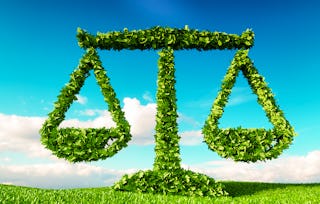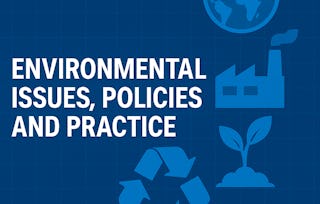Studies of the late twentieth and early twenty-first centuries demonstrated persistent trends in the US: race, income, and other factors predispose marginalized communities to higher toxic waste exposure and poorer quality of air, water, housing, and recreational spaces. In “Environmental Justice,” you’ll learn how these burdens have individual, interpersonal, and intergenerational effects and how environmental justice has helped mitigate these inequities
即将结束: 只需 199 美元(原价 399 美元)即可通过 Coursera Plus 学习新技能。立即节省

您将学到什么
Analyze current trends, events, and changes in the field of environmental justice using knowledge of the field’s history
Describe concepts and actions around the four types of justice as they relate to actions, organizations, and technologies
Contextualize environmental justice work in relation to histories of human inequality, adaptation, and resilience
要了解的详细信息

添加到您的领英档案
5 项作业
了解顶级公司的员工如何掌握热门技能

积累特定领域的专业知识
- 向行业专家学习新概念
- 获得对主题或工具的基础理解
- 通过实践项目培养工作相关技能
- 获得可共享的职业证书

该课程共有6个模块
In this module, we'll talk specifically about how the Environmental Justice movement gained momentum through community responses to the distributive justice problem of inequitable siting of waste facilities in residential areas where nonwhite Americans live. We will discuss the uneven distribution of waste burdens, the "not in my back yard" or NIMBY movements that came together in response to create the wider EJ movement and field of study. We'll scrutinize the socio-environmental implications of waste management, the quest for fairer consumptive and recycling practices, and outline the intricate relationship between activism, research and teaching, policy, and the pursuit of environmental equity.
涵盖的内容
8个视频7篇阅读材料1个作业2个讨论话题
In this module, we will explore the concept of Procedural Justice in the context of EJ, and its institutionalization. Focusing on both Energy Justice Systems, we will discuss decision-making, political contexts and implications for the built environment and human experience. What role does energy access play in achieving Environmental Justice goals? We will have interviews with energy specialists Tony Reames, Deputy Director for Energy Justice at the U.S. Department of Energy and Rahul Agrawal Bejarano, Project Manager and Data Analyst at the Energy Equity Project, to examine cases from their work and assess relevant legislative and policy frameworks. We will also discuss tools for practitioners to incorporate procedural justice principles.
涵盖的内容
5个视频6篇阅读材料1个作业
We define Retributive Justice in relation to EJ, and and aspects of Infrastructural and legal Justice in US carceral and criminal systems that punish those committing harm, contrasting them with the practices currently in vigor vis a vis responsibilities and actions of corporations. We scrutinize punitive approaches, costs and environmental impacts of imprisonment, compared with processes of corporate accountability in light of social and environmental injustices. Through critical analysis, we will engage with the ethics and pragmatics of holding individuals and corporations to account.
涵盖的内容
4个视频4篇阅读材料1个作业
Conceptualize the principles and practices of Restorative Justice as defined by the United Nations, and others, as they relate socially restorative practices in ever wider use to restoration ecology and its expansion at present. The module will not only consider the expanding use of restorative justice circles and related practices in households, schools, local communities and even entire nation states in post conflict settings, but will also consider the relationship between social justice process and the healing of environmental harms through ecological re-introductions and management.
涵盖的内容
4个视频5篇阅读材料1个作业
This module discusses Reparative Justice, widely understood but still limited in practice. It also explores emergent justice frameworks, relying most on the frame of Relational Justice, an emerging term that captures a range of justice approaches that are less transactional or rooted in existing harms and more about harm prevention. We consider these practices in light of histories like slavery and colonial violence that undergird many modern nation states, and relate them to contemporary challenges for attaining climate justice. We review initiatives like the US "Justice 40" push to put funding for climate adaptation into frontline vulnerable communities, and explore their effectiveness in healing harms.
涵盖的内容
5个视频9篇阅读材料1个作业
This module wraps up our course with a synthesis of the course and part 2 of the Interview with Paul Mohai. As a founding father of the EJ movement, it's fitting that our course began and is now ending with the Mohai interview.
涵盖的内容
2个视频1篇阅读材料
获得职业证书
将此证书添加到您的 LinkedIn 个人资料、简历或履历中。在社交媒体和绩效考核中分享。
位教师

从 Governance and Society 浏览更多内容
 状态:免费试用
状态:免费试用University of Michigan
 状态:预览
状态:预览Dartmouth College
 状态:预览
状态:预览O.P. Jindal Global University
 状态:免费
状态:免费Utrecht University
人们为什么选择 Coursera 来帮助自己实现职业发展




常见问题
To access the course materials, assignments and to earn a Certificate, you will need to purchase the Certificate experience when you enroll in a course. You can try a Free Trial instead, or apply for Financial Aid. The course may offer 'Full Course, No Certificate' instead. This option lets you see all course materials, submit required assessments, and get a final grade. This also means that you will not be able to purchase a Certificate experience.
When you enroll in the course, you get access to all of the courses in the Specialization, and you earn a certificate when you complete the work. Your electronic Certificate will be added to your Accomplishments page - from there, you can print your Certificate or add it to your LinkedIn profile.
Yes. In select learning programs, you can apply for financial aid or a scholarship if you can’t afford the enrollment fee. If fin aid or scholarship is available for your learning program selection, you’ll find a link to apply on the description page.
更多问题
提供助学金,



